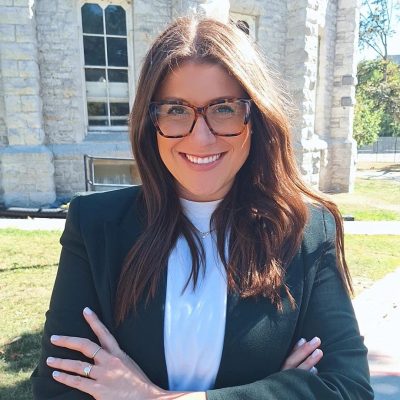Top notch instruction from industry thought leaders.
Tap into the minds of leading academics, judges, senior practitioners and industry experts—each a leader in their respective specialization. Learn more about the diverse range of scholars for this program.
View ProgramHealth Law Faculty
Adrienne Shnier

Dr. Adrienne Shnier, B.A. (Hons.), M.A., Ph.D., J.D., is a lawyer practicing health law at Shnier Law & Policy Consulting, PC in Toronto. Dr. Shnier is an Assistant Professor in the Faculty of Health in the School of Health Policy & Management at York University, and is Program Director of the Health Law LLM program at Osgoode Hall Law School. Dr. Shnier’s teaching and research focuses on pharmaceutical policy and regulation, health policy, health law, and fraud in the health industry, and has published and lectured on her research internationally. Dr. Shnier also supports students in their peak performance and academic success at her company, Apply Yourself Global.

Anita Szigeti is the founding lawyer of Anita Szigeti Advocates, a Toronto firm focusing on mental health and the law. She is currently co-director of the Mental Health Law course within the Health Law LLM at Osgoode Professional Development where she obtained a Certificate in Tribunal Adjudication in 2018. Co-author of three (and a half) text books on mental health law across Canada, she is a recognized expert in the area of mental disorder in both civil and criminal law contexts.
She has been retained as an expert witness in mental health justice matters. Anita has been a leader in the field for 30 years at the Ontario bar. She has been representing clients in Nunavut since 2014 as a member of the Nunavut Law Society. Anita was the Chair of the Mental Health Legal Committee (MHLC) for a decade and the founding first Chair of Legal Aid Ontario’s Mental Health Law & Policy Advisory Group. For six years, Anita served as an elected Toronto Director of the Criminal Lawyers’ Association (CLA) and the Association’s Chair of its Mental Disorder Portfolio. She served as the Women’s Director through COVID in 2020-2021. Anita is President of the Law And Mental Disorder Association (LAMDA), an umbrella advocacy organization of 200 lawyers practising mental health law. She is the Secretary of Women in Canadian Criminal Defence (WiCCD).
Anita’s litigation career spans thousands of tribunal level cases, hundreds of cases argued in appellate Courts including more than a dozen in the Supreme Court of Canada. Anita has also been involved in too many death inquiries focusing on police use of force in interactions with persons in crisis and just as many high profile Inquests concerning other mental health related deaths. In 2016, she joined the prestigious Trial Advocacy faculty at the University of Toronto law school. Teaching advocacy is a long time passion for Anita who has also taught the substantive law of mental disorder throughout her career to Crowns, Coroners, adjudicators, psychiatrists, defence lawyers, clients, their families and anyone else who asked. She has particular expertise in training tribunal, board and agency adjudicators on how to address mental health matters culturally competently. When she’s not mentoring new generations of (mostly women) lawyers or at a Jays’ game with her family, Anita is found in a (now virtual, sadly) courtroom almost every day.
She’s happiest litigating on behalf of vulnerable people, giving a voice to those who otherwise may not be heard at all. When she wins the occasional case, it shocks her most of all, but she lives for those days.
Dr Elizabeth Kirley is a 2021-22 Visiting Scholar at the Nathanson Centre for Transnational Human Rights, Crime, and Security at Osgoode Hall Law School, York University. She is working on two invited book projects: Outsmarting the Next Pandemic: what COVID-19 can teach us (Routledge 2022) and Big Policing and Big Crime: is it all about the money? (University of Toronto Press 2022).
Dr Kirley is the recipient of the 2021 Excellence in Teaching Award for the Master of Laws program at Osgoode Professional Development where she has served as instructor in the Criminal Law & Procedure and Privacy & Cybersecurity programs since 2018. Current and future courses at OPD include Issues in Criminal Law: History, Evolution & Theoretical Approaches; Pandemic Law; Foundations of Digital Crime; Emerging Risks of Digital Crime; and Nonverbal Evidence in Court and Negotiations. Prior appointments include sessional teaching for Osgoode’s juris doctor program (Criminal Law, National Security Law, Crime in the Digital Age, and Law and Policing) as well as in the Sociology Department at York University (Organized Crime & Money Laundering; the Sociology of Policing). She has served as Senior Lecturer in the Faculty of Business and Law at Deakin University in Melbourne Australia and as Assistant Professor of Criminology at Ryerson University.
Dr Kirley is called to the Ontario bar and has served as criminal defence counsel as well as Assistant Crown Attorney and representative of the Office of the Children’s Lawyer for the Ontario Ministry of the Attorney General. She holds PhD and LLM degrees from Osgoode, and a JD from the University of Western Ontario. Her life before law involved broadcast journalism for the Canadian Broadcasting Corporation.
Dr Kirley’s PhD thesis, “Reputational Privacy and the Internet: a role for law?” has led to studies in social media law, cybercrime, and cognitive robotics related to global health, defamation, national security, and evidentiary challenges raised by the emerging law of digital speech. In a series of publications, co-authored with Dr Marilyn McMahon, Dr Kirley examines the humble emoji as a tool of crime, a precursor of digital speech, and a means of conveying human diversity through social media. She has received various distinctions for her work, including a Canada/France Foreign Government Award, European Union Centre of Excellence Award, the Oxford Internet Institute Summer Doctoral Program, the Osnabruck University Law & Culture Award, and two Nathanson Centre Graduate Fellowships at Osgoode Hall Law School. She has taught, conducted research, and presented her work at different universities including the American Graduate School of Paris; l’École des hautes études commerciales de Paris; Sciences-Po University (Paris), University of Toronto Munk School of Global Affairs; Quello School of Communications at Michigan State University; University of Limerick Faculty of Law, Ireland; Duquesne School of Law, Pennsylvania; the Instituto Universitario de Lisboa in Portugal ;and the Academy of Legal Studies in Business in Montreal. Her work is published in several peer reviewed journals.

Eric Mathison, PhD, is a clinical ethicist for Alberta Health Services, a clinical lecturer at the John Dossetor Health Ethics Centre at the University of Alberta, and the chief clinical ethicist of Compass Ethics, a consulting firm. Eric regularly publishes in leading health ethics journals on values-based medicine, assisted dying, and the ethics of emerging technologies. He is also a certified health ethics consultant (HEC-C). Click here to learn more.

Lisa Feldstein is a health lawyer specializing in fertility, mental health and guardianship law at Lisa Feldstein Law Office PC. Her practice is unique in her focus on advocacy for family caregivers. She has taught Health Care Law at York University (Faculty of Health) for nearly a decade. Lisa authored the Reproductive Law chapter in Introduction to Health Law in Canada and volunteers with Prenatal Screening Ontario. Lisa holds a B.A from the University of Guelph and a J.D. from Osgoode Hall Law School. She was called to the Bar of Ontario in 2011.

Marian MacGregor is executive director of the Centre for Human Rights, Equity & Inclusion at York University.
Ms. MacGregor previously served as an equity advisor with the Law Society of Ontario. Prior to this, she was interim director of York’s Centre of Human Rights, Equity & Inclusion, and was director of Osgoode Hall Law School’s Community and Legal Aid Services Program (CLASP). She also founded the Disability Law Intensive.
Before joining Osgoode in 2008, Ms. MacGregor worked for 11 years in community legal clinics where she supported individuals with low income in diverse areas of law, including human rights, housing, social assistance and employment. She also worked as a human rights lawyer for the Commonwealth Human Rights Initiative in India, advocating for the rights of prisoners and prison staff through the Police, Prisons & Human Rights program.
Ms. MacGregor received her BA from the University of Toronto, her LLB from the University of Windsor and her MA in Critical Disability Studies from York University.

Martin Lapner is a partner in the Ottawa office of Gowling WLG. He practises in health law and privacy, with an emphasis on professional regulatory and civil liability matters, data governance and AI regulation.
Martin serves as an editor for the Electronic Healthcare Law Review and has authored numerous articles addressing critical and emerging topics in health and privacy law.
Martin is a co-instructor for the Osgoode Hall Law School LLM course on Information Technology and Privacy in Health Law. He is frequently invited to speak on medical-legal issues related to the integration of information technology in healthcare.
Maureen Murphy is a partner in Gowling WLG’s Ottawa office. Maureen’s practice focuses on health law, medical defence and privacy law, including acting as counsel to the Canadian Medical Protective Association. She has experience representing clients before the Federal Court, Superior Court of Justice, as well as various administrative tribunals. Maureen has a particular interest in information technology and privacy law issues that affect physicians.
Maureen is recognized as a privacy lawyer with a proactive and practical approach to privacy compliance. She assists clients in developing privacy policies, responding to access requests, and managing data breaches.
Maureen is a co-instructor for the Osgoode Hall Law School LLM course on Information Technology and Privacy in Health Law. She regularly speaks on medical-legal issues arising from the use of information technology in the practice of medicine.
Robert Sheahan is a partner at Gowling WLG practising in health law and solicitors’ negligence. He acts as General Counsel to the Canadian Medical Protective Association (CMPA), assisting physicians in the context of professional discipline matters and professional negligence. He also manages solicitors’ negligence claims and errors & omissions matters for the Ottawa office of Gowling WLG.
Robert is certified by the Law Society of Ontario as a specialist in health law and has consistently been recognized by Best Lawyers in Canada and Lexpert as a leader in the fields of health care law and medical negligence, including being distinguished as Lawyer of the Year in Health Care Law for Ottawa in 2017.
He is currently an Honorary Member of the Executive of the National Health Law Section of the Canadian Bar Association. He has been an active member of the Executive since 2009 and served as Section Chair in 2011-2012. Previously, he served on the Executive of the Health Law Section of the Ontario Bar Association, including as regional representative for the East Region.
A passionate and enthusiastic speaker, Robert is an instructor at the Osgoode Hall LL.M Health Law Program and has been a guest lecturer at the University of Ottawa Faculties of Law and Medicine. He regularly presents on health law before groups, including the American Bar Association, the International Bar Association and the Society of Obstetricians and Gynaecologists.
Robert is an active supporter and coordinator of the firm’s participation in events to support REACH Canada, a national non-profit charitable organization for persons with disabilities. Having been bless with wonderful mentors over the years, Robert is committed to mentoring associates and students, and actively participating in the firm’s student recruitment initiatives.
In addition to serving on the editorial board of the Electronic Healthcare Law Review, Robert has authored a number of papers, including “Liability and Privacy Considerations with Personal Health Records,” “Unbundling Healthcare: The Changing Nature of the Practitioner-Patient Relationship As a Result of Electronic Health Records,” “Limiting Non-Pecuniary Damages: The Effectiveness of Caps,” “Expert Immunity: Canadian Implications of Jones v. Kaney” and “The Value of a Trusted Advisor.”
Robert has appeared before the Ontario Provincial Court, Superior Court of Justice, Court of Appeal, as well as various administrative boards and tribunals, such as health professions boards and commercial tribunals. He is also an active member of The Advocates’ Society, the International Bar Association, the County of Carleton Law Association, and a volunteer judge at moot competitions and other legal education initiatives, including serving as co-chair of the annual Courthouse Series in Ottawa from 2009 to 2015.

Ruby Dhand, B.A. (Western Ontario), M.A. (Carleton), LL.B. (Ottawa), LL.M. (Toronto), Ph.D. (Osgoode), is a Full Professor in the Faculty of Law at Thompson Rivers University (TRU). She was called to the Bar in Ontario in 2008. Dr. Dhand joined the TRU Faculty of Law in 2012. She was awarded the TRU Law Teaching Excellence Prize by the Student Law Society in 2019, 2021 and 2022 and the Recognition of Excellence Award by the TRU Board of Governors in 2021.Dr. Dhand has been awarded a number of Tri-Agency research grants including the SSHRC Insight Development Grant, SSHRC Partnership Development Grant, the CIHR Fellowship in Health Law and Policy, the SSHRC Doctoral Fellowship, along with multiple Law Foundation of BC Grants. Her major areas of research are mental health law, human rights law, health law and policy, disability law, access to justice, the impact of race, culture, ethnicity and other intersectional factors upon the law, clinical legal education and science and law. Dr. Dhand has published extensively in refereed journals including the International Journal of Law and Psychiatry, the Windsor Yearbook of Access to Justice, the Canadian Journal of Comparative and Contemporary Law, the Manitoba Law Journal (Criminal Law Edition) and the Canadian Journal of Disability Studies. She is a co-author of four editions of the Halsbury’s Laws of Canada: Mental Health (LexisNexis, Canada, 2023) and a co-author of the book Law & Disability in Canada: Cases & Materials (LexisNexis Canada, 2021). Dr. Dhand is currently the Principal Investigator for a number of SSHRC-funded qualitative legal research projects. Her research has been used for law reform initiatives to increase access to justice across Canada.
Dr. Dhand has appeared in the Supreme Court of Canada as part of legal teams led by Anita Szigeti on behalf of the Empowerment Council in British Columbia (AG) v CCD and Ontario (AG) v G. Dr. Prior to joining the TRU Faculty of Law, Dr. Dhand worked as Anita Szigeti’s first legal intern and at ARCH Disability Law Centre in disability rights law. At TRU, Dr. Dhand led the development and establishment of the TRU Community Legal Clinic, the faculty’s first clinical law program. At TRU Law, Dr. Dhand teaches in the areas of Mental Health Law & Policy in Canada, Human Rights Law, Health Law, Community Lawyering and Clinical Legal Education. She is also currently co-director (with Anita Szigeti) of the Mental Health Law course within the Health Law LLM at Osgoode Professional Development.
For full bio, click here.
Vanessa Gruben is an Associate Professor in the Common Law section of the University of Ottawa, Faculty of Law where she teaches property law, family law and a seminar on access to health care. Vanessa’s research focuses on the legal regulation of various aspects of assisted human reproduction including contractual disputes over frozen embryos, privacy and access to information, gamete donor anonymity, the regulation and funding of assisted reproductive technologies, and the constitutionality of the Assisted Human Reproduction Act. Her research also includes health law more generally as well as the protection of language rights in Canada. For a full bio click here.

